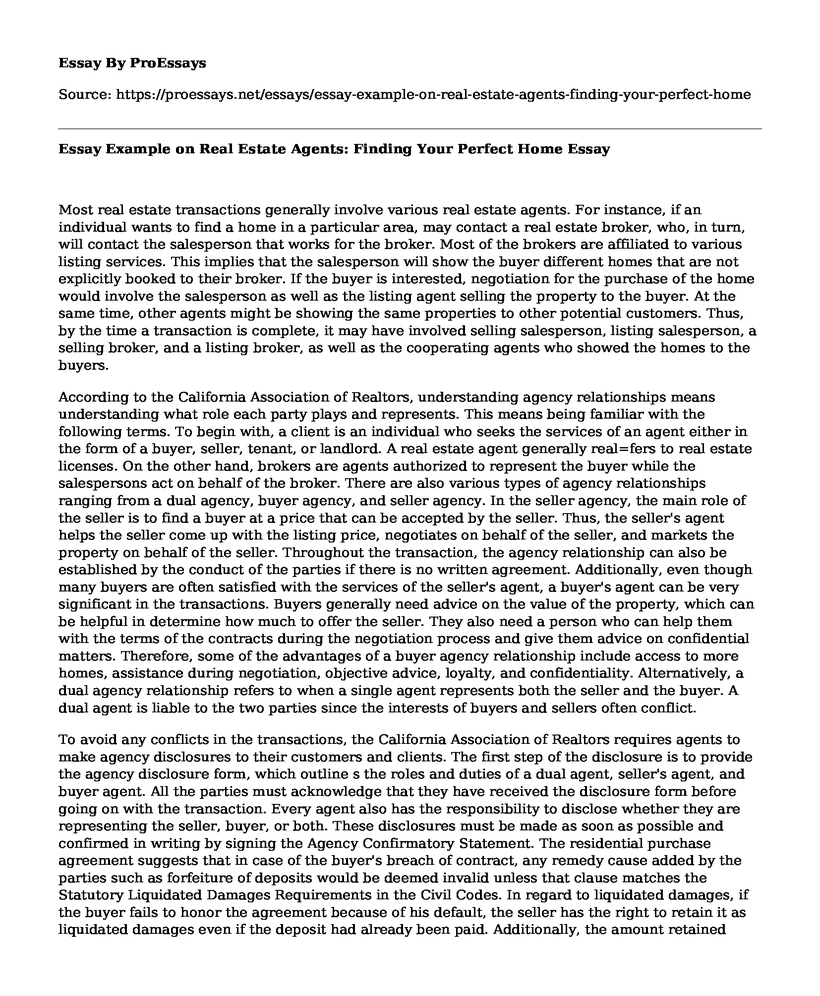Most real estate transactions generally involve various real estate agents. For instance, if an individual wants to find a home in a particular area, may contact a real estate broker, who, in turn, will contact the salesperson that works for the broker. Most of the brokers are affiliated to various listing services. This implies that the salesperson will show the buyer different homes that are not explicitly booked to their broker. If the buyer is interested, negotiation for the purchase of the home would involve the salesperson as well as the listing agent selling the property to the buyer. At the same time, other agents might be showing the same properties to other potential customers. Thus, by the time a transaction is complete, it may have involved selling salesperson, listing salesperson, a selling broker, and a listing broker, as well as the cooperating agents who showed the homes to the buyers.
According to the California Association of Realtors, understanding agency relationships means understanding what role each party plays and represents. This means being familiar with the following terms. To begin with, a client is an individual who seeks the services of an agent either in the form of a buyer, seller, tenant, or landlord. A real estate agent generally real=fers to real estate licenses. On the other hand, brokers are agents authorized to represent the buyer while the salespersons act on behalf of the broker. There are also various types of agency relationships ranging from a dual agency, buyer agency, and seller agency. In the seller agency, the main role of the seller is to find a buyer at a price that can be accepted by the seller. Thus, the seller's agent helps the seller come up with the listing price, negotiates on behalf of the seller, and markets the property on behalf of the seller. Throughout the transaction, the agency relationship can also be established by the conduct of the parties if there is no written agreement. Additionally, even though many buyers are often satisfied with the services of the seller's agent, a buyer's agent can be very significant in the transactions. Buyers generally need advice on the value of the property, which can be helpful in determine how much to offer the seller. They also need a person who can help them with the terms of the contracts during the negotiation process and give them advice on confidential matters. Therefore, some of the advantages of a buyer agency relationship include access to more homes, assistance during negotiation, objective advice, loyalty, and confidentiality. Alternatively, a dual agency relationship refers to when a single agent represents both the seller and the buyer. A dual agent is liable to the two parties since the interests of buyers and sellers often conflict.
To avoid any conflicts in the transactions, the California Association of Realtors requires agents to make agency disclosures to their customers and clients. The first step of the disclosure is to provide the agency disclosure form, which outline s the roles and duties of a dual agent, seller's agent, and buyer agent. All the parties must acknowledge that they have received the disclosure form before going on with the transaction. Every agent also has the responsibility to disclose whether they are representing the seller, buyer, or both. These disclosures must be made as soon as possible and confirmed in writing by signing the Agency Confirmatory Statement. The residential purchase agreement suggests that in case of the buyer's breach of contract, any remedy cause added by the parties such as forfeiture of deposits would be deemed invalid unless that clause matches the Statutory Liquidated Damages Requirements in the Civil Codes. In regard to liquidated damages, if the buyer fails to honor the agreement because of his default, the seller has the right to retain it as liquidated damages even if the deposit had already been paid. Additionally, the amount retained should be no more than 3% if the buyer intended to occupy a dwelling property with no more than four units. The excess amount will be returned to the buyer unless there is mutual consent from both parties. In case of any increased amounts, both parties shall sign a separate liquidated damages provision that includes the increased amounts as liquidated damages.
Conclusion
In summation, according to the California law on real estate, dispute resolution can be made only through arbitration of disputes and mediation. Concerning mediation, both parties would have to mediate any conflicts before resulting to court of action or arbitration, as stated in the California Association of Realtors. If there will be any mediation fees, it will be shared among the involved parties or whichever case they agree upon. Regarding arbitration, the buyer and seller can acknowledge that any dispute in equity or law that is not solved through mediation would be handled by arbitration. The arbitrator can be a retired judge with at least more than five years of residential real estate law experience unless they agree on another arbitrator.
Works Cited
California Association of Realtors. California Real Estate. Vol. 68. California Association of Realtors, 2018.
Cite this page
Essay Example on Real Estate Agents: Finding Your Perfect Home. (2023, Apr 24). Retrieved from https://proessays.net/essays/essay-example-on-real-estate-agents-finding-your-perfect-home
If you are the original author of this essay and no longer wish to have it published on the ProEssays website, please click below to request its removal:
- The Central Challenge of Global Strategy Essay
- Police Officer PTSD and Mental Health Videos Reflection Essay
- Article Analysis Essay on Self-Driving Cars: Is It Reckless to Delay
- Car Sales & Interest Rates: Factors Affecting Vehicle Transactions - Essay Sample
- Essay Example on Ethical Considerations: An Essential Part of Business Success
- E-Scooter Sharing: The Solution to Last Mile Transport in NZ & AU - Essay Sample
- Free Report on Comparing Murder & Salvation: A Community's Resilience







